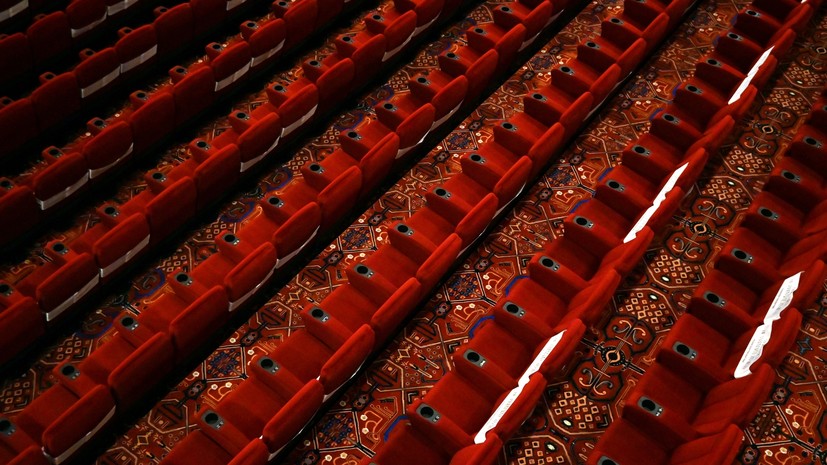Shortly after the Russian government refused to provide cinemas with subsidies of 6.5 billion rubles, demanding additional justification for the payment of funds, it became known about the closure of several cinema halls.
In particular, the work of two Moscow cinemas of the United Cinema Network "Cinema Park" and "Formula Kino" was stopped.
The sites were located in the Ladoga and Global City shopping centers.
The Mirage Cinema cinema in the Tetris shopping center in Petrozavodsk also closed temporarily, as network representatives promise.
In addition, the head of the Union of Shopping Centers, Bulat Shakirov, told Izvestia about possible litigation between cinemas that closed in Moscow and landlords.
According to him, the parties entered into indissoluble contracts, according to which the cinemas had to work until the end of the contract.
President of the Russian Council of Shopping Centers Dmitry Moskalenko explained in an interview with RT that not all owners of cinema halls who decide to close will face such problems.
“Conditions for the suspension of the contract can be anything, it depends on the specific shopping center and the specific tenant, and they will negotiate among themselves.
In principle, if cinemas do not show anything and they have zero visitors, then this may well slide into the repayment of expenses that the shopping center incurs within this premises: a minimum of electricity, a minimum of operating costs, etc.
In such volumes, this is the minimum minimum, ”says Moskalenko.
Pessimistic forecasts
Member of the Board of the Association of Cinema Owners Mikhail Malakhov recalled pessimistic forecasts regarding the future of the cinema business.
According to him, by the summer of 2022, about 70% of Russian cinemas that worked before the start of the current problems will cease their activities.
“Some funds were allocated to the producers, they are making a movie, but there will simply be no place to show it,” notes Mikhail Malakhov.
Dmitry Moskalenko also expects a negative scenario for the development of events.
According to him, the Russian Council of Shopping Centers “even from the moment the pandemic began, said that closures were inevitable due to the fact that there were no visitors, there was no flow.
And all this leads to the fact that there are costs and no revenue.
“Since March 2020, we have been saying that such business closures, especially from more affected industries, are quite likely.
Thanks to the support of the landlords, this has not happened for a long time, but at the current moment, even with the support of the landlord and in the absence of content that cinemas could play, it is obvious that the situation for them has not improved, but worsened.
They have nothing to show,” concluded Moskalenko.
When asked about the support that landlords have provided and continue to provide, he noted that it most often consists in reducing rents - similarly, the owners of shopping centers reacted in the midst of the coronavirus pandemic.
According to Moskalenko, discounts for cinemas reached 85%.
faint hope
Mikhail Malakhov, in an interview with RT, explained that formally the government did not refuse to support cinemas - the organization had not received an official response at all.
However, he stressed that so far "no one is making progress on reducing / zeroing out rent, on reducing some local taxes."
“Yes, some preferential subsidies are being discussed, but these are talks, nothing more.
It takes a lot of time to design them, ”says Malakhov.
The press service of the KARO network told RT that they were also very much looking forward to subsidies, since they had used up “all their margin of safety” in the midst of the pandemic.
Now, "without government support, cinemas really cannot survive."
“We are losing up to 85% of revenue depending on the region.
All initiatives to reform the display only marginally close the losses, without completely solving the problem.
However, on our own, we do everything in our power.
The main task for us was the differentiation of the repertoire - we added more national and niche content, opened the Video Bloggers in Cinema project, we offer cinema halls for rent for personal occasions and for game parties, ”the press service said.
According to Mikhail Malakhov, releases of high-quality Russian films can also affect the current situation, but it is necessary that they come out as soon as possible.
“I believe in domestic cinema, and now we really need films like Kholop, which the audience goes to see.
But what will happen in this case with cinemas is unknown.
“Kholop” may be new and will appear, but where it will be shown is already a question.
The film production process takes many months, or even years, and a possible help could be to speed up the process of those films that are, for example, in post-production, ”Malakhov emphasizes.
Serious problems in the cinema business began in March - after major Hollywood studios, amid a special operation in Ukraine, refused to release their new films in Russia.
Then the press service of the KARO cinema chain said that blockbusters account for up to 80% of the cinemas' revenue.
In order to attract viewers, the largest Russian cinema chains have decided not to raise prices for tickets and cinema bar products.
In addition, Soviet films, as well as Russian and foreign films already familiar and beloved by the audience, began to be released.
At the same time, more Indian-produced projects appeared on big screens, and in mid-May it became known that films, series and animation from Iran would begin to be shown in Russian cinemas.
Nevertheless, according to the expectations of the Association of Cinema Owners, by the end of 2022, the total loss of cinemas will be more than 11.1 billion rubles.
Russian films are forecasted to receive no more than 6.142 billion rubles.

